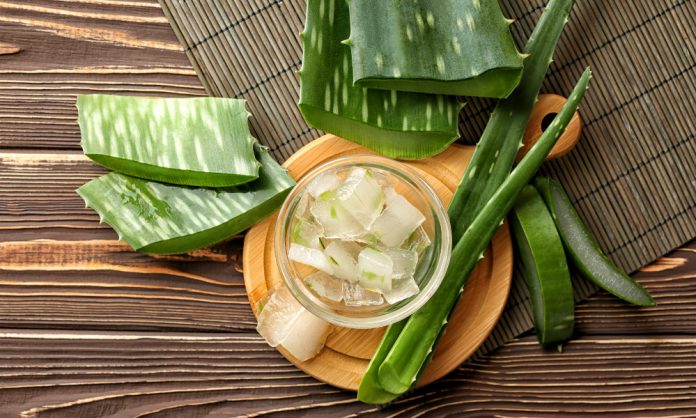
Aloe vera is a natural plant gel that can be prepared into various products like aftershaves and lotions, or it can be used directly as is from the leaves of the aloe plant.
This well-known soothing succulent has over 75 active ingredients, including the antioxidant vitamins A, C, and E, multiple minerals, amino acids, and even salisylic acid.
It has a proven track-record in moisturizing the skin and relieving burns, with the main use of it being as an after sun lotion.
But what does aloe vera do to your beard?
Does it boost growth, can you use it as after shave balm, and is it really a suitable natural beard gel to moisturize the beard with?
Answers to all of these questions – and a bonus list of the best aloe vera beard products – can be found below.
Does Aloe Vera Promote Beard Growth?
No. Aloe vera does not promote beard growth. Sure it’s a good moisturizer with soothing benefits, and it can be applied to the face without any problems, but this doesn’t mean that it would help your beard grow any faster.
There is no known mechanism of action as to how aloe vera could possibly help your beard grow and there are no studies that would show this taking place either.
It’s the same exact thing as with beard oil.
Most people – especially the manufacturers themselves – make the claim that it would promote growth, but in reality it only gives your beard some moisture and shine.
That’s great for sure, but enhanced moisturization does not translate to faster or thicker beard growth.
Can You Use Aloe Vera to Moisturize Facial Hair?
Aloe vera is known for its skin hydrating and soothing benefits, and it’s often added to moisturizers and sold as is for relieving sunburns.
It contains vitamin A and the antioxidant vitamins C and E, along with amino acids and salisylic acid. In total, there are 75 active compounds in the plant, most of which have positive effects on skin health and hydration.
When it comes to moisturizing the facial hair, aloe vera is a great choice. It can help replenish and nourish the dry skin underneath the beard and adds some moisture and shine directly to the beard hair fibers.
As an added benefit, natural aloe vera gel does not contain any man-made estrogenic chemicals like parabens, which would potentially hinder your beard gains.
Can Aloe Vera Lighten Facial Hair Naturally?
Since aloe vera contains small amounts of vitamin C and salisylic acid, it has a gentle bleaching effect on the hair.
Because of this, it can slightly lighten your pre-existing beard hairs, but this is not permanent and the effects are barely visible to begin with.
In a way, aloe vera is a very gentle natural beard dye alternative, although there are some other natural beard dyes that are far more effective for their intended purpose, so you really shouldn’t rely on aloe as your go to natural beard coloring agent.
Aloe Vera is Best Used on Facial Hair as Aftershave Balm
Undoubtedly the best way to use aloe vera on your facial hair is to use it as a natural after shaving balm.
It replenishes the skin, soothes any possible razor burns, and can help prevent and reduce the occurrence of razor bumps.
This is why you can typically find it as ingredient in many popular aftershaves, but you don’t have to get a dedicated after shave balm to enjoy the benefits of the plant, just using the pure aloe vera gel will work just as well.
How to use pure aloe vera gel as aftershave balm:
- Shave your facial hair in which ever way you prefer (maybe just the upper cheeks and beard neckline if you’re growing out a beard).
- Immediately after shaving, put on a thin layer of the aloe vera gel all over the areas where you shaved.
- Let the aloe vera slowly absorb into your skin and work its magic. If you still feel any burning or itch after, apply another layer.
Conclusion
As you can see, aloe vera is a super versatile plant with great all-natural benefits for both the skin and the beard.
You can use it as a moisturizing beard gel or as a preshave lotion/aftershave balm.
Sadly, it does not directly enhance beard growth, even though many beard products manufacturers who formulate it into their products like to make the claim.















